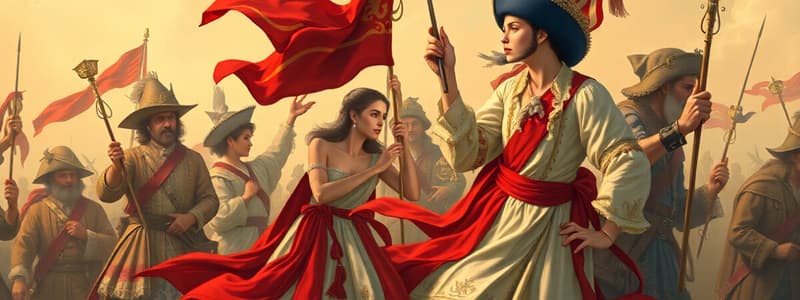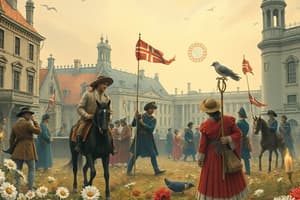Podcast
Questions and Answers
What was the immediate response of New York to the Quartering Act of 1765?
What was the immediate response of New York to the Quartering Act of 1765?
- They nullified the Act themselves.
- They backed down after a threat from Townshend. (correct)
- They agreed to supply British troops willingly.
- They protested against the Act.
What was the primary objective of the Revenue Act of 1767?
What was the primary objective of the Revenue Act of 1767?
- To eliminate the American Board of Customs Commissioners.
- To support colonial self-government initiatives.
- To tax American imports such as tea and glass. (correct)
- To abolish all taxes on imports.
How did Townshend differentiate his duties from the Stamp Act?
How did Townshend differentiate his duties from the Stamp Act?
- He classified them as external taxes rather than internal ones. (correct)
- He increased the public visibility of the tax collectors.
- He eliminated taxation on essential goods.
- He created more penalties for non-compliance.
Who argued that only colonial assemblies had the power to tax commerce for revenue purposes?
Who argued that only colonial assemblies had the power to tax commerce for revenue purposes?
What criticism did colonists have against the American Board of Customs Commissioners?
What criticism did colonists have against the American Board of Customs Commissioners?
What was the general hope of the colonies regarding Townshend's policies?
What was the general hope of the colonies regarding Townshend's policies?
What impact did the distinction between internal and external taxes have on colonial resistance?
What impact did the distinction between internal and external taxes have on colonial resistance?
What was a significant effect of the threats made by Townshend regarding colonial laws?
What was a significant effect of the threats made by Townshend regarding colonial laws?
What were the Townshend duties primarily aimed at generating?
What were the Townshend duties primarily aimed at generating?
What did the colonists' statement justifying the taking up of arms ultimately reject?
What did the colonists' statement justifying the taking up of arms ultimately reject?
What significant action did the Congress take regarding military command?
What significant action did the Congress take regarding military command?
Which critical ally did the Americans eventually gain support from during the conflict?
Which critical ally did the Americans eventually gain support from during the conflict?
What major disadvantage did Great Britain face in the war?
What major disadvantage did Great Britain face in the war?
What was one of the Congress' responses to Britain closing the colonies to all trade?
What was one of the Congress' responses to Britain closing the colonies to all trade?
What challenge did George Washington face in leading the Continental Army?
What challenge did George Washington face in leading the Continental Army?
What was one significant challenge faced by the Continental Congress during the American Revolution?
What was one significant challenge faced by the Continental Congress during the American Revolution?
Who were the individuals that opposed the American Revolution and supported the British?
Who were the individuals that opposed the American Revolution and supported the British?
What percentage of Americans is estimated to have supported Great Britain during the American Revolution?
What percentage of Americans is estimated to have supported Great Britain during the American Revolution?
Which group fought with the British during the American Revolution?
Which group fought with the British during the American Revolution?
Why did some Native Americans support the British during the American Revolution?
Why did some Native Americans support the British during the American Revolution?
What motivated some enslaved individuals to join the British forces during the war?
What motivated some enslaved individuals to join the British forces during the war?
What was a common perception among some colonists about the potential revolution?
What was a common perception among some colonists about the potential revolution?
What role did New York City play during the American Revolution?
What role did New York City play during the American Revolution?
Who among the following groups was most likely to oppose the American Revolution?
Who among the following groups was most likely to oppose the American Revolution?
What can be said about the impact of Loyalists on the American Revolution?
What can be said about the impact of Loyalists on the American Revolution?
What was the primary goal of the colonial leaders before the outbreak of hostilities?
What was the primary goal of the colonial leaders before the outbreak of hostilities?
What significant event occurred on April 19 during the American Revolution?
What significant event occurred on April 19 during the American Revolution?
Who rode out to alert the townspeople of the impending movement of British troops?
Who rode out to alert the townspeople of the impending movement of British troops?
What was the outcome of the Battle of Bunker Hill?
What was the outcome of the Battle of Bunker Hill?
What did the Olive Branch Petition aim to achieve?
What did the Olive Branch Petition aim to achieve?
Which group captured Fort Ticonderoga with the hope of using its cannons?
Which group captured Fort Ticonderoga with the hope of using its cannons?
What was General Thomas Gage ordered to do in Massachusetts?
What was General Thomas Gage ordered to do in Massachusetts?
What percentage did imports drop by from 1774 to 1775 as part of the colonial economic strategy?
What percentage did imports drop by from 1774 to 1775 as part of the colonial economic strategy?
What did the colonies use to prepare for quick military action against the British?
What did the colonies use to prepare for quick military action against the British?
Which British governmental figure attempted to find a compromise with the colonies?
Which British governmental figure attempted to find a compromise with the colonies?
What was the main purpose of the Tea Act of 1773?
What was the main purpose of the Tea Act of 1773?
What event is marked by the actions of fifty men disguised as Mohawk Indians boarding a ship?
What event is marked by the actions of fifty men disguised as Mohawk Indians boarding a ship?
What was a significant consequence of the Boston Tea Party?
What was a significant consequence of the Boston Tea Party?
Which act allowed British troops to be housed in private buildings?
Which act allowed British troops to be housed in private buildings?
Which of the following measures was NOT included in the Coercive Acts?
Which of the following measures was NOT included in the Coercive Acts?
What did the colonial reaction to the Tea Act indicate about their view of British taxation?
What did the colonial reaction to the Tea Act indicate about their view of British taxation?
What was the primary aim of the Intolerable Acts from Parliament's perspective?
What was the primary aim of the Intolerable Acts from Parliament's perspective?
How did the Coercive Acts impact the governance of Massachusetts?
How did the Coercive Acts impact the governance of Massachusetts?
What was the main reason behind the Boston colonists' actions during the Boston Tea Party?
What was the main reason behind the Boston colonists' actions during the Boston Tea Party?
Which of the following statements best describes the British government's reaction to the Boston Tea Party?
Which of the following statements best describes the British government's reaction to the Boston Tea Party?
Flashcards are hidden until you start studying
Study Notes
Colonial Response to British Legislation
- Charles Townshend opposed the Stamp Act but continued to raise revenue through the Revenue Act of 1767, imposing duties on glass, lead, paper, paint, and tea.
- The Townshend duties faced backlash, with John Dickinson asserting that only colonial assemblies had the right to tax commerce.
- To regulate these duties, Townshend created the American Board of Customs Commissioners, whose zealous enforcement led to resentment among colonists.
Loyalists and Patriots
- Divided loyalties characterized the American colonies; those supporting Britain were called Loyalists (or Tories), while those opposing were known as Patriots (or Whigs).
- Approximately twenty percent of Americans identified as Loyalists, including merchants reliant on British trade and officials fearing chaos from independence.
- The conflict drew in diverse groups, including Native Americans, who primarily sided with the British due to land disputes and slaves seeking freedom by joining British forces.
Boston Tea Party and Colonial Resistance
- To salvage the East India Company, the Tea Act of 1773 granted it a monopoly on tea sales, lowering prices but igniting colonial outrage over the implied right to tax.
- In defiance, colonists, led by Samuel Adams, dumped an entire shipment of tea into Boston Harbor during the Boston Tea Party on December 16, 1773, marking a transition from protest to direct action.
Coercive Acts and Escalation
- Parliament responded to the Boston Tea Party with the Coercive Acts (also known as the Intolerable Acts), which included closing Boston's port and revoking parts of the Massachusetts charter.
- The acts intensified colonial grievances and galvanized resistance, leading to the formation of a united front among the colonies.
Outbreak of Hostilities
- Economic pressure tactics led to a significant drop in imports, heightening tensions as British officials sought to quell unrest in Massachusetts.
- The first armed conflict began on April 19, 1775, at Lexington and Concord, resulting in casualties for both British troops and colonial militias.
Key Battles and Continental Congress
- The Battle of Bunker Hill on June 17, 1775, emerged as the first significant battle of the Revolution, demonstrating colonial resolve despite a British victory.
- The Second Continental Congress convened, expressing loyalty to the Crown while preparing for war, ultimately declaring the Continental Army with George Washington as commander.
Shift Towards Independence
- Despite sending the Olive Branch Petition seeking reconciliation, the Congress transitioned towards a self-governing approach, establishing a Continental Army and navy.
- By late 1775, with continued hostilities and Parliament's refusal to compromise, the push for independence gained momentum.
British Advantages and Challenges
- Despite the strengths of the British military—over 100,000 troops, extensive resources, and the world's largest navy—logistical challenges complicated their operations.
- The American forces, fighting for their liberties on familiar terrain, had the advantage of motivation and emerging leadership in Washington, though they comprised poorly trained militias.
Studying That Suits You
Use AI to generate personalized quizzes and flashcards to suit your learning preferences.




